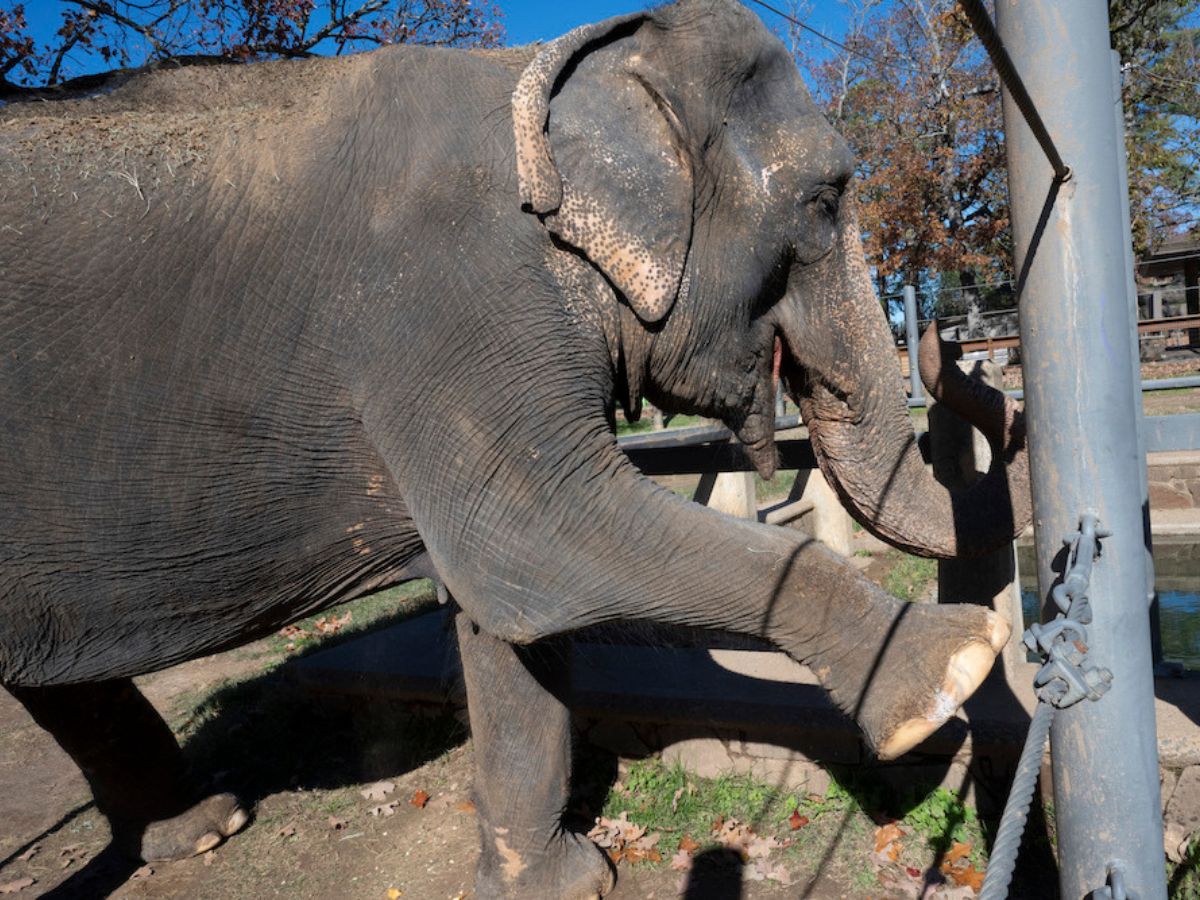The Little Rock Zoo announced today that Sophie, an Asian elephant, has entered hospice care after a 7-year battle with a pyometra, a serious uterine infection that is incurable and inoperable in elephants.
Most elephants with pyometra survive less than a year.
From the zoo’s press release:
In the last few weeks zoo staff observed that a firm mass had developed in Sophie’s belly, likely because of the progression of the disease. Blood protein levels taken from Sophie are lower than normal, also indicating disease progression. Sophie has also lost significant muscle mass from muscle wasting created from fighting a chronic disease.
Zoo staff evaluate Sophie daily for quality of life and are letting her guide the way on next steps. Two full-time veterinarians are on call every day of the week to attend to Sophie and the disease is being managed as best as possible with pain medications and antibiotics. Based on evaluation, Zoo staff could choose humane euthanasia to peacefully end Sophie’s life or Sophie could pass on her own.
At the time of Sophie’s passing, the Zoo will be closed to the public so that Zoo staff can conduct a necropsy. The Zoo conducts necropsies on animals after their passing to gain insight on cause of death and to collect samples for research.
In January, former Arkansas Times reporter Mary Hennigan wrote a story diving deep into the intensive care routine for the zoo’s elderly elephant trio that contained a plethora of information about the beloved Sophie. (Her nickname among caretakers is “Sluffy,” for example).
From Hennigan’s story:
Caring for an 8,000-pound elephant requires ingenuity. Sophie needs a variety of daily medications, which are snuck into her food and sometimes supplemented with treats; she likes Skittles. A large 20-gauge needle is used to take blood from a soft part in her ear weekly, and the zoo’s veterinarian crew occasionally administers cold laser therapy to reduce inflammation and electromagnetic field therapy to promote healing. A portable X-ray and ultrasound machine also make it possible to examine Sophie at her enclosure, rather than transfer her to the comparably small hospital space.
“On a sunny day in mid-November, caretaker Chris Sauder wielded a pole with a tennis ball attached to its end and instructed Sophie to meet the target with her feet. Sauder moved the pole around her body, prompting Sophie to meet it at varying heights for food rewards. Every time she met the target, Sophie snarfed up a dog treat and left Sauder’s hand covered in elephant slobber.
It’s clear the pair have established trust, and Sauder seems used to the slobber. He tosses a few dog cookies to the ground and warns that no one should ever bend down and pick up a treat that’s been dropped. “We don’t want you to headbutt the elephant,” Sauder said.
The two continued their dance for several minutes, and Sophie occasionally lifted two legs at once — an ultimate display of her balance. She also positioned herself in a proper elephant version of downward-facing dog. The stretching keeps Sophie limber.”
Elephants grieve, and when Sophie or one of the other elephants dies, their body will stay in the enclosure for a short time. [Elephant Manager Kristin] Grove said examining the body will help the elephants get closure. When this happens, the zoo will likely be closed to the public, she said.
After death, the zoo’s vet team completes a necropsy and examines the organs for cancers or other viruses. Parts of the organs are then sent out for research purposes, and the Little Rock Zoo withholds parts of the animals’ tissue.
Sophie was born in the wild and worked as a circus elephant for Ringling Brothers and Barnum & Bailey before retiring to the Niabi Zoo in Illinois. In 2013, Sophie and her companion, Babe, moved to the Little Rock Zoo, which is known for its care of female geriatric elephants.
Sophie can still be seen in the elephant habitat at the zoo and “has the freedom to roam in between her outside yard and her enclosure as she pleases,” the press release states.

